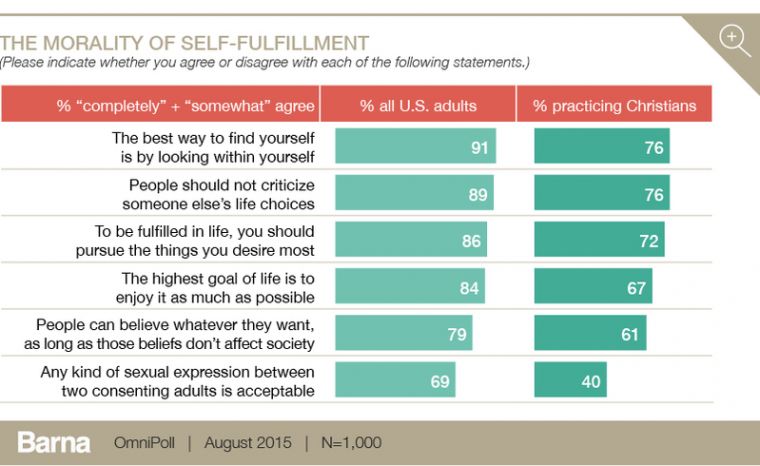It's not you, it's me: How the religion of self is pushing God to the margins

Is truth absolute or relative? How do you decide right from wrong? Do Christians feel differently about this than the culture in general, or are we pretty much the same?
And underlying all these questions: what is the Church actually for?
These are some of the issues raised in a fascinating survey for the Barna group. It's based on research in America and the context is American, but some of it translates well enough to the UK situation.
Barna found there was widespread concern about declining morality, particularly among older Christians but among people of no religion too. But there was far less consensus about what morality was based on. Most people said it was based on personal experience or cultural consensus, though Christians are far less likely to believe that "whatever is right for your life or works best for you is the only truth you can know" than the general population.
According to Barna "Americans are both concerned about the nation's moral condition and confused about morality itself". Its president David Kinnaman says a new "morality of self-fulfilment" has replaced Christianity as the culture's moral norm.
This morality has six guiding principles. They are: the best way to find yourself is by looking inside yourself, people shouldn't criticise others' life choices, and to be fulfilled in life you should pursue the things you desire most. The highest goal of life is to enjoy it as much as possible and you can believe whatever you like as long as those beliefs don't affect society.
Support for those positions among Christians runs from 78-61 per cent. The only 'principle' on which Christians disagree with the culture is the final one: "Any kind of sexual expression between two consenting adults is acceptable," which only 40 per cent of practising Christians agreed with.

Writing in Good Faith: Being a Christian When Society Thinks You're Irrelevant and Extreme, Kinnaman says: "The highest good, according to our society, is 'finding yourself' and then living by 'what's right for you. There is a tremendous amount of individualism in today's society, and that's reflected in the church too. Millions of Christians have grafted New Age dogma onto their spiritual person. When we peel back the layers, we find that many Christians are using the way of Jesus to pursue the way of self...While we wring our hands about secularism spreading through culture, a majority of churchgoing Christians have embraced corrupt, me-centered theology."
This interpretation sounds very persuasive, very alarming and very depressing. It rings all sorts of bells about the contemporary Church. Ministers like Joel Osteen are accused of being "feelgood preachers", like Robert Schuller before him. Creflo Dollar declares that Jesus died so that we can be rich.
And underneath this profound malaise is a failure to understand something about the nature of the Church.
If Christians are really buying in to what Kinnaman calls the "morality of self-fulfilment", it's because they have forgotten what the Church is for.
It's not there to solve problems, though it may. It's not there to make people happy, or rich, or satisfied. The Bible does not belong on the self-help shelves in a bookshop.
Church services should not be trying to make people feel better about their lives, though they may. Worship songs should not try to soothe and comfort. The Church exists in order to give glory to God and bear witness to Christ.
It's only natural that people should go to church when they feel that there's something lacking in their lives. Many have been healed and made new. Addictions have been cured, relationships have been restored, sin has been dealt with and God has been glorified.
But that isn't what the Church is for, as if it exists to provide a service to its clients. These are things that happen when the Church is being true to what it is: the witness to and incarnation of the Lord Jesus Christ himself.
So the Church has to resist all of those six guiding principles, not just the one about sex. Pursuing the things we desire most is not the way to fulfillment. The highest goal of life is not to enjoy it as much as possible. If you look inside yourself for ultimate truth you'll find nothing, because truth is revealed, not invented.
Every church, and every pastor, has to walk the line between letting God bless those who seek him and declaring the unchanging truth of his Word. But we can never let the Christian faith become so absorbed into the culture that it becomes meaningless feel-good psycho-babble. It is the gospel of grace and redemption from sin.
Follow Mark Woods on Twitter: @RevMarkWoods











